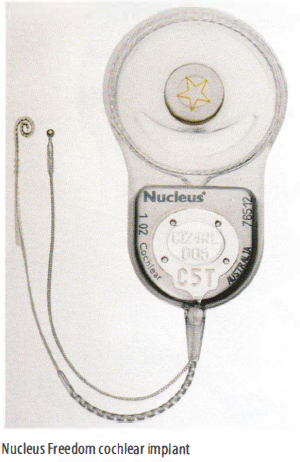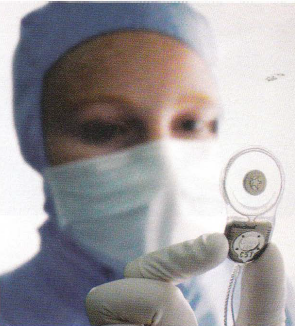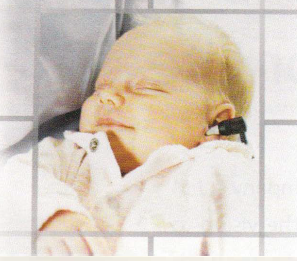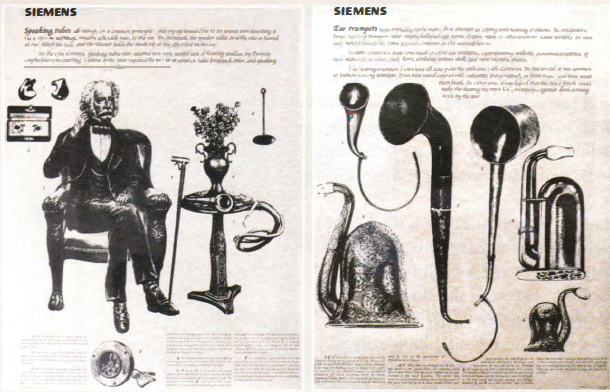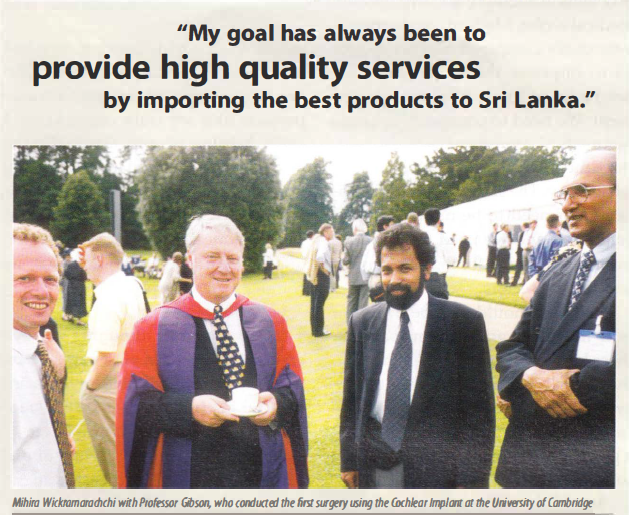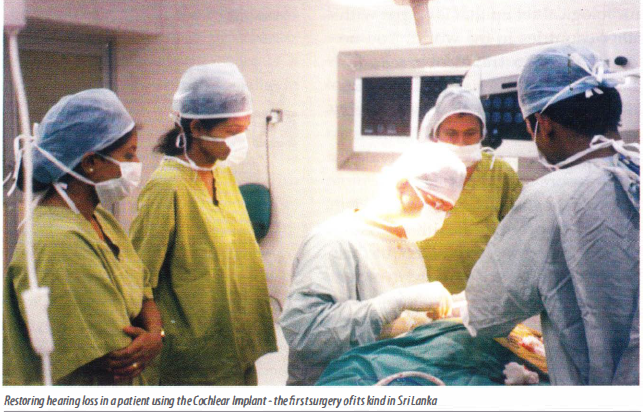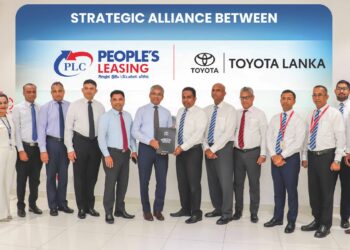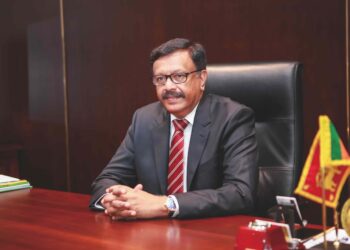By Anisha Niyas
When Mihira Wickramarachchi established his company – J M Wickramarachchi & Company – in 1976, he had the vision to provide quality yet affordable products to the public in the fields of optometry and audiology. With 12 sales branches and clinics in Colombo, Kandy, Kurunegala and Galle today, his vision has turned into a reality. His products and services have made a huge impact on the lives of many citizens. Business Today met with Wickramarachchi to learn about his business of helping people to see and hear, and the industry in general.
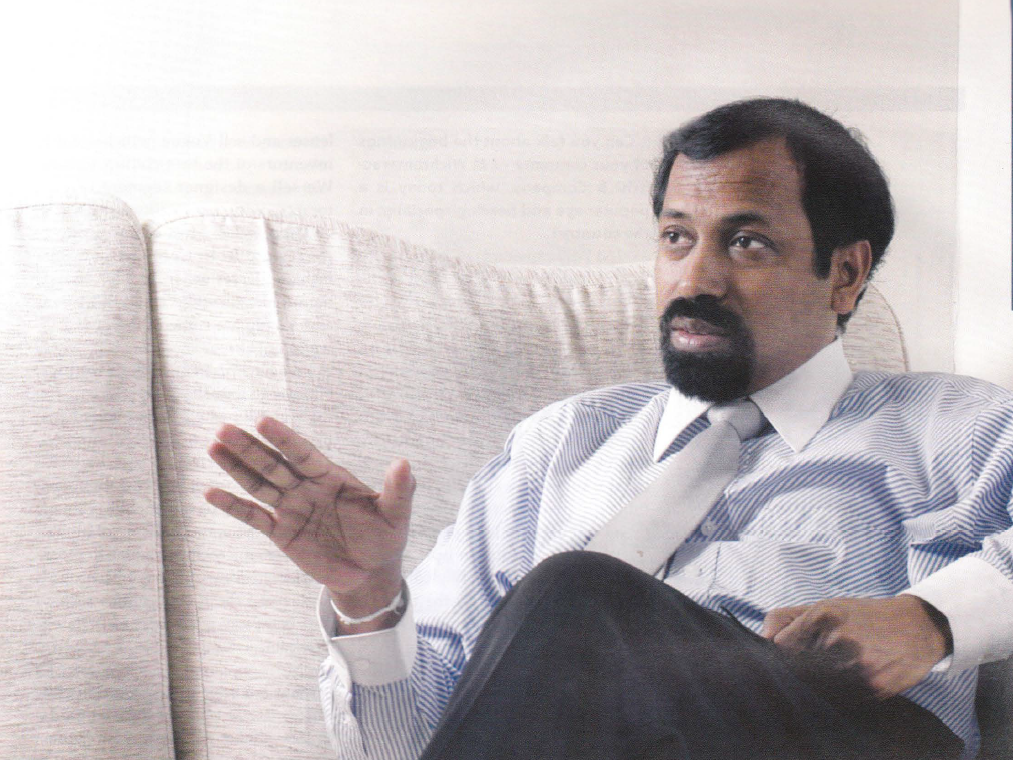
Can you talk about the beginnings of your company – J M Wickramarachchi & Company, which today is a popular eye and hearing specialist in the country?
J M Wickramarachchi & Company is a trademark and as the CEO of the company I have been involved with it since its inception. We complete 30 years in service this year. My involvement in the field of optometry, and later audiology, is born out of the wish to do good; to make a difference through my contribution. My family comes from an engineering background so I wanted to do something different where if I make profit, then I can use it to help people. We are not only an optical and audiological company. My company is one of the pioneer in the field of electromedical engineering. My goal has always been to provide high quality services by importing the best products to Sri Lanka. We have introduced the speech vibrator, digital hearing aids, modern contact lenses, contact lens solutions, modern audiological equipment as well as the world renowned Cochlear Implants to Sri Lanka. Today J M Wickramarachchi & Company, with its popular Wickramarachchi Opticians outlets, enjoys a sound reputation and we are considered the best in Sri Lanka.
Tell us about the other sectors J M Wickramarachchi & Company has branched out into?
We provide tailor-made contact lenses and sell Vogue, which are the inventors of the best contact lenses. We sell a designer segment of optometry with top quality sunglasses and spectacles. Most of our product ranges are from Germany and our fashion glasses are from Italy. Brand names like Chanel, Versace, Ray Ban and Vogue are some of the products we offer. We have also entered into the mobile phone industry where we import Bird mobile phones and sell these trendy handsets in the local market. The field of electronics and the technology of hearing aids was the foundation that led us into mobile phones. Through the manufacturing of digital products, microchips similar to those used in hearing aids have been used to develop the mobile phone sector. Our company is a partner of Dialog Telekom.
“The standards in Sri Lanka are comparable to others in Asia. In many cases, we are far ahead in terms of the products and services we provide.”
What are your thoughts on the industry itself? How do the standards in Sri Lanka compare with other countries?
The standards in Sri Lanka are comparable to others in Asia. In many cases, we are far ahead in terms of the products and services we provide. The industry is developing well and with the introduction of hi-tech Cochlear Implants, the industry will thrive. We need to focus on providing quality products – although they may be expensive, it is ultimately cost-effective. For example, the Cochlear Implant is the most advanced surgical implant in the world. It is worth about Rs8-12 million but we offer it in Sri Lanka for the economical price of a little over Rs2 million. Currently, Cochlear controls a market share of 70% in hearing implants worldwide. So we have never faced failure because of the quality products we offer to the local market. We have brought a higher standard of health care into Sri Lanka in the fields of optometry, audiology and electro-surgical engineering. The electro-surgical equipments we have introduced here provide the complete audiological set up that is on par with other countries in the world. You no longer need to travel overseas for these kinds of surgeries; Sri Lanka has high standards, which unfortunately people are not aware of. Sri Lanka is a high-end market, which is equivalent to Singapore and Malaysia. The health sector should be developed to promote health tourism. We need to strongly think about this tie up with the tourism board in order to develop appropriate policy. Our surgeons and medical technology are modern while our hospitals in both the private sector and government sector have the necessary modern surgical equipments. We have all kinds of high quality medical and diagnostic equipments. We also offer speech habilitation and a verbal therapy program after the Cochlear Implant has been inserted into the ear. This is now an important sector in the world because of the introduction of wireless bluetooth technology like the binaural hearing aid, which is the latest in Europe.
J M Wickramarachchi & Company is the local agent for Cochlear International. Tell us about the product and how it helps patients?
Cochlear Limited is the company that pioneered Cochlear Implant technology. It is a world-renowned product that helps hearing impaired people to hear for life. Prof Graeme Clark pioneered the multiple-channel cochlear implant for people with a severe-to-profound hearing loss. It is a highly sophisticated speech processor and is built to mimic the natural function of the human ear. Unlike hearing aids, which only amplify sound, the Cochlear Implant bypasses the damaged part of the ear and stimulates the hearing nerve directly. It is the best and the most expensive surgical implant in the world. The Cochlear Implant system is a safe, reliable and effective treatment for severe to profound hearing loss in adults and children. It is also a routine medical intervention especially for children who are born hearing impaired or people with moderate hearing loss. It is designed to let implant users experience sounds and helps to enhance communication abilities, allowing better hearing and speaking potential for the recipients. I am very proud that this year my company launched Cochlear Implants in Sri Lanka. We have conducted 18 surgeries on different patients and they were all successful. People are surprised that in a small country like Sri Lanka we are capable of such surgery with high technology tools. The Australian High Commissioner personally attended the series of surgeries we did at the Durdans and Apollo Hospitals. The President Fund is supporting this initiative. The first candidate of the Cochlear Implant can now speak three languages and the first baby to receive this hearing aid can peak too. Without this implant they would have been completely hearing impaired.
What are the challenges Sri Lanka faces as a whole in providing quality products in the fields of optometry, audiology and the health industry in general?
Unfortunately, government hospitals lack the coordination and resources to provide quality products and care to patients. Private practitioners are better equipped because they can afford to do so. The main challenge is the lack of funding. The government needs to provide appropriate funding for this sector or there will be a segment of the population with minor disabilities, who can with the necessary simple treatment fully participate in society. The state should encourage the private sector to give care when they cannot do it single-handedly. Companies such as mine face many problems in attempting to improve the medical sector. Medical engineering is very costly compared to other sectors so to improve these standards we need a lot of funds from the government. We need to constantly upgrade our medical equipment because every three months, the world develops new technology. The standards in the medical sector need to be monitored and controlled and we need to introduce insurance schemes for the government and private sectors. Patients should also be aware of how much the government pays for these kinds of surgeries. Only then can they learn to value the free health care system in the country. People who can afford to pay for their surgery at a government hospital should be able to do so. In addition, improving funding to local hospitals is imperative. This will allow them to conduct research and build infrastructure. There are several restrictions on this sector without proper coordination. Sri Lanka needs to have a national policy for the whole healthcare sector, because, without it, we will only delay our development.
Has J M Wickramarachchi & Company undertaken social work for the local community, say with the provision of eyeglasses and hearing aids to the poor?
We have a charity called the Sunflower Village, which has both audiological and optical departments. We provide hearing care and tailor-made spectacles to those who need it the most. We support various projects and we train coworkers. I enjoy helping people, especially the disabled because I find it is a satisfying experience. I feel that if the business community spent at least 0.2% of their time and money on charity work, the quality of life for all citizens in the country would improve. D What are your thoughts on eye care in Sri Lanka? In your experience, have eye problems like myopia increased in children or is it that people are more aware of it now? I feel people are aware about eye care and related diseases in Sri Lanka. We do not have a significant number of eye problems in the country and the cases of myopia are only a small percentage. A problem we face is the lack of awareness about the need for eyewear to protect against damage caused by the sun. The sunlight in Sri Lanka is very strong and although sunglasses have caught on here, it is worn predominantly in the name of fashion. What people don’t realize is that it is an important part of protecting one’s eyes. We need to incorporate these notions into schools.
Do you have any tips on how parents can spot that their children have problems pertaining to hearing or sight?
The most important aspect is to identify the problem early. We have a high percentage of disabled kids because we do not do habilitation in time. As with almost all medical ailments, earlier the detection, the better the chance of successfully treating it, especially in children. Hospitals should check the sight and hearing of newborns so the process is less protracted. It is vital that the parents know to spot the early signs a child may display, like if the child doesn’t respond to sound or doesn’t develop appropriate speaking skills for his/ her age. Parents need to be attuned to these conditions because the sooner the child is diagnosed; the less complicated the treatment, and the better the chance of a successful recovery. D What is the secret behind the success of your company? We are far ahead not only in the product and equipment we offer but also in the technology and surgical know-how we possess as well. We feel that there is no competition in this business because we always bring new innovations. Our staff is well trained and motivated. That is our fundamental strategy. I believe that quality is the most important element; if you have quality products and high standards, then you cannot go wrong.
